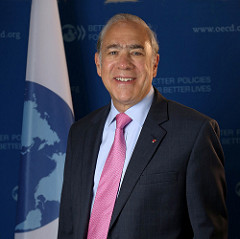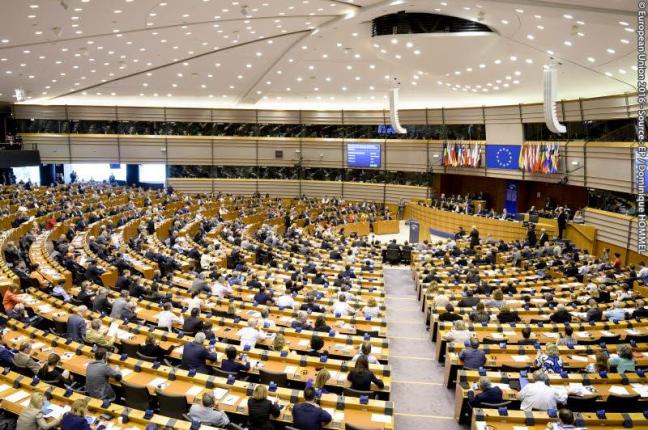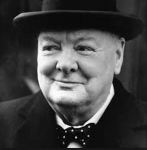Remarks by Angel Gurría, OECD Secretary-General at the London School of Economics on 27 April 2016:
Ladies and Gentlemen,
 It is a great pleasure to be at the LSE to share the perspective of the OECD on the possible economic repercussions of Brexit. The decision on Brexit is one which will impact on generations to come, so it is fitting that we are in a place devoted to forming future British, European and global leaders. The stakes are high, and understandably, people are in search of objective and dispassionate information and analysis on which to base their decision. That’s where the OECD comes in.
It is a great pleasure to be at the LSE to share the perspective of the OECD on the possible economic repercussions of Brexit. The decision on Brexit is one which will impact on generations to come, so it is fitting that we are in a place devoted to forming future British, European and global leaders. The stakes are high, and understandably, people are in search of objective and dispassionate information and analysis on which to base their decision. That’s where the OECD comes in.
At the OECD, we advocate making policy decisions using evidence-based analysis. We advocate policies that improve the well-being of people. We advocate national policies that take due account of spillovers on the rest of the world. The UK is one of our founding members and one of our most active members. If it’s important for the UK, it’s important for the OECD. Besides, an event of the scale of Brexit has implications not only for the wellbeing of every British citizen, but for the people across the EU, the OECD and beyond. Thus, at the OECD we are duty-bound to assess the possible consequences and flag the risks associated with this decision. I would also say, setting aside my OECD hat for a moment, that I have personal reasons for joining this debate. I came to Britain for the first time in the early 70s, as a student at Leeds University. It was a challenging time of miners’ strikes, 3-day working weeks, energy crises and electricity blackouts. I then came back, this time to London from 1976 to 1978, as Mexico’s Permanent Delegate to the International Coffee Organisation. Since then, over more than 40 years, I have witnessed first-hand the dramatic transformation of this country. The cosmopolitan Britain that I see today, where my son and his wife live, work, pay taxes and raise and enjoy their own children, bears little resemblance to the more inward-looking society I first encountered before the United Kingdom joined the European Union. I will focus today on the economic aspects of Britain’s membership of the European Union. No time to dwell on the EU’s role in preserving peace in Europe and spreading it around the world, as was recognised when the European Union was awarded the Nobel Peace Prize in 2012. It is not the occasion either to elaborate on the EU’s leadership role in environmental issues and their crucial contribution to the success of COP21. Nick Stern, who kindly invited me here today, is the very embodiment of the influence the UK had in that success. Nor do I need to belabour the EU’s virtue as perhaps the greatest exponent of soft power in the world. Neighbouring countries queue up to join the European Union, drawn by the example of its stable, peaceful, prosperous and democratic societies. Certainly no one would claim that the EU is a finished product. The scaffolding is not easy on the eye but the structures being built behind it eventually become a source of admiration and collective strength, once the scaffolding is removed. Being part of this constant work in progress, of this worthy and visionary project, with its vocation for permanent change, reinvention and institutional innovation, makes the UK stronger. Why would anyone want to give up this truly win-win proposition? Brexit, on the contrary, could threaten both the unity of the UK, because of Scotland’s expressed desire to remain part of the EU, as well as the unity of the EU itself, because of the likelihood of other countries believing that there is merit in following the UK’s example. Being a member of the European Union has been good for the UK. Since the United Kingdom joined the European Union in 1973, its GDP per capita has doubled. This is not only more than in the other major EU member states, but also more than in English-speaking countries that are not EU members. More than the United States, Canada, Australia and New Zealand. Look at another English-speaking country, Ireland, which joined the EU at the same time. Its GDP per capita has quadrupled since 1973! The evidence over the past four decades suggests that, far from holding back growth, harnessing the potential of the European single market enhances living standards. Let’s now turn to the future and to the question the British people will have to answer in two months’ time.
The Brexit Referendum: A Taxing Question
The question posed in the referendum, “Should the United Kingdom remain a member of the European Union or leave the European Union?” is a taxing one. Taxing in the sense that its consequences are complex and permanent, not only for the UK but also for the rest of the EU and even beyond. So the responsibility borne by British voters on June 23rd is very serious indeed. It will be an act of intergenerational responsibility. But also taxing because Brexit would, rather like a tax, hit the wellbeing and the pockets of UK citizens. Unlike most taxes, however, this one will not finance the provision of public services or close the fiscal gap. The “Brexit tax” would be a pure deadweight loss, a cost incurred with no economic benefit. And this tax would not be a one-off levy. Britons would be paying it for many years. The OECD has estimated the scale of this Brexit tax for UK households. The details of the relevant criteria and calculations are included in the report that we have distributed to you this morning (Download the report). We are aware of the analysis the UK Treasury produced last week with the same purpose. The LSE’s Centre for Economic Performance has also produced excellent research on the matter. And there is also the report commissioned by the Confederation of British Industries. At the end of our report there is a comparison of the four calculations. There are, of course, some differences in the numbers coming out of these different efforts. Sometimes it is a matter of different time horizons, or variations in assumptions about post-Brexit trading arrangements. Different models can be employed, and research findings drawn from different sources will lead to different estimated costs. But the results are quantitatively similar and qualitatively the same: the UK would be worse off under Brexit. And our estimates are too cautious. For one thing, they focus entirely on future effects, whereas in fact the first payments of the “Brexit tax” are already being made. Just this morning, the Office for National Statistics announced the lowest quarterly GDP growth figures since 2012. And already in the previous quarter, business investment was weak as the Brexit issue gained prominence. Brexit costs can also be seen in financial markets. Since the autumn, the pound has weakened against the euro and the dollar, and the cost of insuring against exchange rate volatility has risen significantly. The costs are piling up, and we are still two months away from the referendum!
The economic effects of Brexit: the OECD’s estimate Near-term effects
Our analysis looks at the effects of a decision to leave the EU over two horizons. From the moment of a Brexit vote until the arrangements for “divorce” are definitively settled — years later — there would be heightened economic uncertainty, with damaging consequences. Brexit would lead to a sell-off of assets and a sharp rise in risk premia. Consumer confidence would fall, as would business confidence and investment, thus holding back growth. Were the United Kingdom to leave the EU, it would have to negotiate new trading relationships. Brexit would mean that the UK would not only give up full and automatic access to the Single Market, but would also lose the benefit of trade agreements covering 53 markets that it currently enjoys and which it helped shape. Supporters of Brexit argue that the UK would actually achieve a more liberal trade regime outside the EU than it enjoys now. But this is a delusion. Bilateral and regional trade agreements take years to negotiate and absorb substantial energy and resources. The United Kingdom would be starting from scratch. The first priority would be to negotiate with the rest of the European Union, which accounts for nearly half of UK exports. Facing an embittered, freshly-rejected and much larger partner with an incentive to make exit costly, is not a good basis for a favourable outcome. Regarding non-EU trading partners, as President Obama reminded us last week, the UK on its own would not be exactly their top priority for negotiating trade deals or granting generous trade concessions. The rewards for potential partners would have considerably shrunk. Taking into account the effects of heightened uncertainty and the less favourable trading environment while new arrangements are negotiated, we put the “Brexit tax” at some 2200 pounds per household by 2020.
Longer-term effects
Over the longer term, the supply side of the British economy would also be negatively affected by Brexit. Without full access to the Single Market, the lure of the UK, which currently receives the largest inflows of foreign direct investment in Europe, would wane. Some foreign businesses that set up here to access the European market could even decide to relocate. The same would apply to many British multinationals. The negative impact on net FDI would hit total investment, innovation and productivity and would also aggravate the adverse trade effects. Bear in mind also that well over two million UK citizens benefit greatly from the freedom to live, work and study anywhere in the EU. These are some of the freedoms that we should not take for granted. This is a particularly relevant issue for those of who already see yourselves as British, Europeans and citizens of the world. That would be put in jeopardy by Brexit. Less investment, reduced flows of goods and people, costlier credit and lower exposure to ideas and skills across borders would ultimately undermine productivity and the long-run economic capacity of the UK economy. We estimate that in a Brexit scenario, GDP per household in 2030 would be lower than the baseline by at least 3200 pounds and up to 5000 pounds in the most pessimistic case. While no one knows precisely what the costs would be, what is striking about our estimates and those produced by most others is that all the numbers under a Brexit case are negative. The best outcome under Brexit is still worse than remaining an EU member, while the worst outcomes are very bad indeed. The Brexit tax just gets bigger. We see no economic upside for the UK whatsoever. The only question is where, on the spectrum of possible losses, the outcome winds up. The bigger question is why spend so much wealth, well-being, time, energy and talent in order to compensate the damage of a bad decision when you can simply avoid taking such decisions. Why spend so much effort trying to recover the benefits of membership in a club you don’t have to leave? Some are invoking the question of the UK’s sovereignty. But they are invoking a false dichotomy. It is not about the UK being sovereign or not. All countries take decisions on whether to pool their sovereignty depending on the issues involved. The UK does this as a member of NATO, the OECD, the IMF, the World Bank, the ILO and ultimately the United Nations. Taken to the extreme, it would have to leave all these institutions in the quest for “sovereignty”. In reality, the UK, like other countries, weighs the costs of membership against the benefits. Sovereignty is not lost. It is simply used wisely. As a part of the EU, the UK always retains the right to withdraw from the EU, but it leverages its sovereignty to shape a Europe more aligned with the interests of the United Kingdom itself. Such was the case of the deal struck by Prime Minister Cameron last February. If the UK chooses to give up the opportunity to help steer Europe in the right direction, it would be doing so at its own peril. Ladies and gentlemen, We recognise that economic considerations are not the only rationale for voting to remain or exit, and it is for the British people to weigh the different pros and cons. The late Lord Ralf Dahrendorf put it very clearly when he said “For the resolution of conflict by negotiation, and for engendering a habit of peaceful co-operation, the European Union is seen by many as a model. And Britain must be part of that model.” It already is and there’s every reason to stay. Our conclusion is unequivocal. The UK is much stronger as a part of Europe, and Europe is much stronger with the UK as a driving force. There is no upside for the UK in Brexit. Only costs that can be avoided and advantages to be seized by remaining in Europe. No one should have to pay the Brexit tax.
Thank you!


 It is a great pleasure to be at the LSE to share the perspective of the OECD on the
It is a great pleasure to be at the LSE to share the perspective of the OECD on the 
